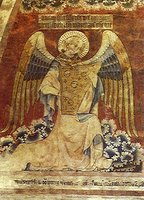
It is nice to be able to take some time to relax after the vigorous workout that Sunday always seems to be. It is good, though, to be tired for working for the Lord. This is something that everyone who follows Christ should feel often. It today's gospel, the announcement of the death and resurrection that Jesus gives the disciples leads, instead of humble acceptance and fortitude, to an argument among the apostles about who would be the greatest. Jesus sets a child in their midst and suggests that those who would be greatest in the Kingdom of God would be those who serve and seek the lowest place. They should become as lowly and unassuming as a child.
The apostle James suggests that the divisions and malice that dwell among men is the result of our own sinful attitude. We desire, but we cannot have. We ask but not rightly.
St. Thomas Aquinas once addressed the question of whether the prayers of the saints in heaven were always answered. His response was that when in heaven, the saints' will is totally fixed upon and in union with God's will. Therefore, since God's will will be done, the prayers of the saints are always answered. The sed contra was, I believe, that if that were so, it would mean that the saints in heaven had lost or given up their free will. This would mean that the saints had suffered a privation as a result of their salvation, which of course would be absurd. Aquinas then posited that they did in fact retain their free will (a gift from God that was part of the wholeness of man), but since the goal of their will on earth was there before them, i.e., God, that having obtained what their wills had always sought, they would never turn away from but were fixed upon the object of their wills. They were totally in conformity with the will of God, thus their prayers are always answered, because they only will what God wills, and, whether we here below like it or not, God's will is always accomplished. If we asked, rightly, as the apostle James suggests, then our prayers would be always answered, too. For they would always be in union with the will of God.
The above picture of a medieval fresco is one that I took when I was in France on a pilgrimage to Lourdes in 2000. It was taken at the church of the Jacobins or Dominicans in Toulouse. St. Thomas Aquinas is buried in this church which is famous architecturally for only having two aisles rather then the regulation 3 or 5, so the columns run down the center of the church. The capitals of the pillars and the vaulting are made to look like palm trees, which I would show you if the blog would accept the picture, which for some reason it is not.